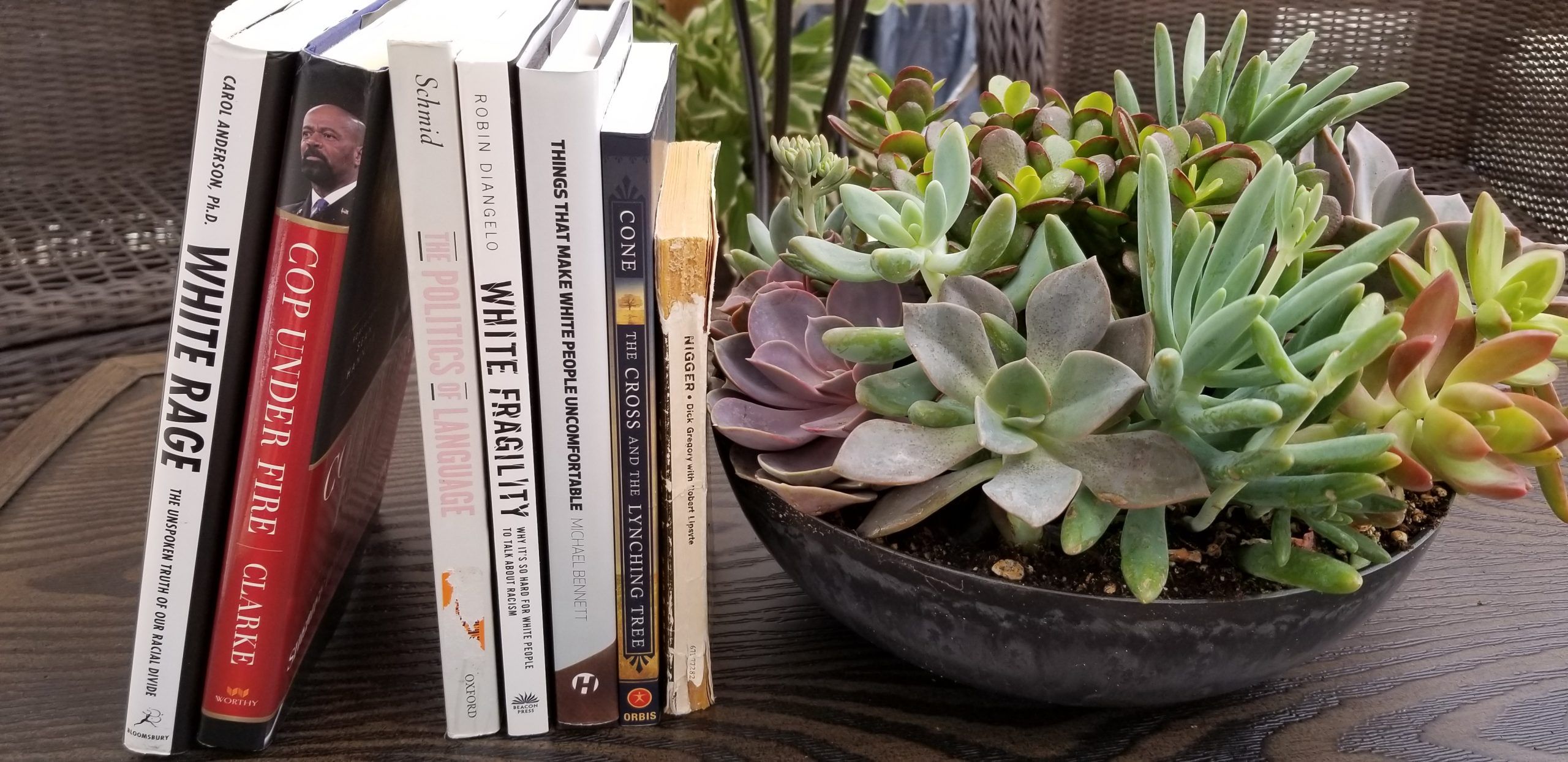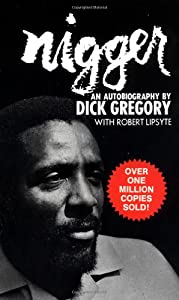
It has often been said that books serve as windows, mirrors, and doors. In times of crisis, we need them more than ever. These are the books that have most impacted and educated me about what it means to be Black* in America in the 21st century. These are the books I believe every white* American should read regardless of their political or religious affiliation because as Harlan Ellison is credited with saying, "[We] are not entitled to [our] opinion[s]. [We] are entitled to [our] informed opinion. No one is entitled to be ignorant." (1)
 n****r by comedian and civil rights activist Dick Gregory
n****r by comedian and civil rights activist Dick Gregory
(autobiography/memoir 1964)
On the cover of my copy of the book Mr. Gregory says: "Dear Momma--Wherever you are, if you ever hear the word 'n****r' again, remember they are advertising my book." (Out of respect for the African American community I have chosen not type or say the n-word even in this context.)
Not long after the murder of Trayvon Martin, I picked this book up at a yard sale. I'm somewhat embarrassed to say that it was the first memoir written by a person of color that I'd ever read. In fairness, the only other memoir (if you can call it that) I'd read to that point was Anne Frank's diary. Mr. Gregory's book is what sparked my love of the memoir genre.
He gave me a glimpse into a world that I had never seen and will never experience. He offered me the other side of the story, the side none of my white relatives ever told me. He took me by the hand and let me walk the streets with him as a child, let me hide under a bar stool and listen to conversations and watch interactions. He let me see his weaknesses as well as his strengths, and he told me exactly what it took to turn a comedian into a serious social justice activist.
The price stamped on the cover of my 1971 edition is 95 cents, but the information and humanity found within its tattered cover are priceless.
 The Cross and the Lynching Tree by Christian theologian James H. Cone
The Cross and the Lynching Tree by Christian theologian James H. Cone
(religion/politics & state, Christian theology/liberation 2011)
Born to Southern parents and raised in a staunchly Republican evangelical Christian home, I was never exposed to the horrors of discrimination and systemic racism on American soil. While living in German, my parents took my siblings and I to the Dachau concentration camp and educated us about the horrors of WWII as they related to people of the Jewish nationality and faith. But in the thousands of hours I spent in church and private schools, I have no recollection of anyone ever talking about Jim Crow laws and the unspeakable brutality perpetrated on Black Americans throughout history. In that world, slavery was a thing of the past, and I knew nothing of the state-sanctioned genocide of Native Americans until I went back to college in my late 30s to pursue a degree in anthropology. (2)
As someone who long ago divorced herself from the belief system of the Christian faith but who understands evangelicals and respects educated people of faith who walk their talk, I was grieved and encouraged by this book. Through his books and lectures, Mr. Cone created a space for people on the right and left, whites and people of color, people of faith and secular humanists to come together on common if blood-stained ground and find a way to heal.
 Cop Under Fire: Moving Beyond Hashtags of Race, Crime & Politics for a Better America by Sheriff David Clarke Jr. foreword by Sean Hannity
Cop Under Fire: Moving Beyond Hashtags of Race, Crime & Politics for a Better America by Sheriff David Clarke Jr. foreword by Sean Hannity
(law enforcement politics/Christian social issues 2017)
You might be surprised to see this book on my list. I include it because Sheriff Clarke is an elected official and law enforcement officer, is African American, is a Christian, and what many might call ultra conservative. His multi-faceted perspective is, therefore, relevant and must not be ignored. Cop Under Fire is an eye-opening read, especially for cloistered progressives.
Having said that, I was extremely disappointed that while he cites sources throughout the book, in chapter 16, "War Has Been Declared on the American Police," he selectively cites sources and appears to pull statistics from meta analyses without citing the original source. This allows him to set up a straw man argument. I find this frustrating and disingenuous.
 Things That Make White People Uncomfortable by NFL star Michael Bennett
Things That Make White People Uncomfortable by NFL star Michael Bennett
(social activist biography/sports biography 2018)
In America, we laud professional athletes for their work ethic and mental and emotional fortitude. They personify the American spirit and allow us to pretend that we live in a meritocracy.
But the same people who vote for candidates with strong (or superficially strong) business backgrounds are the ones who tell Black athletes to "Shut up and dribble" and say that kneeling during the National Anthem is not an exercise of their First Amendment right but an act of disrespect for the values our country was founded upon (3, 4, 5).
Mr. Bennett disabuses us of the idea that athletes who've earned their position through hard work and who have a range of experiences most Americans will never come close to having, giving them insights average Americans can't even fathom, are somehow not qualified to speak about politics. He goes on to demonstrate with specific examples that despite accomplishment and wealth, he is evaluated first and foremost based on the color of his skin.
I was shocked by the reason he gave for appearing bare skinned on the cover. Clearly, I still have a lot to learn.
 White Fragility: Why It's So Hard for White People to Talk about Racism by Robin Diangelo
White Fragility: Why It's So Hard for White People to Talk about Racism by Robin Diangelo
(cultural anthropology/personal transformation/self-help 2018)
I live in Idaho, one of the most, if not the most, conservative states in America. Several of our neighbors fly huge Trump flags. One has a Confederate flag planted at the mouth of their walkway.
About a year ago, my husband suggested that we hang a rainbow flag, a Black Lives Matter flag, and an American flag outside our home and place matching stickers on our vehicles. I argued that we'd be putting a target on ourselves and that I'd rather create a safe space to engage in conversation with people without preconceived notions. Flags and stickers were fine for other people, but to me, educated and persuasive as I saw myself, conversation seemed the more noble course of action.
Even now I bristle when I read or hear Robin Diangelo's statement that all whites in America are racist. But after reading her book, I cannot deny it. It took my husband's repeated mention of an outward expression of our stated beliefs, reading this book, and the murder of George Floyd for me to realize that I've been hiding behind my white privilege. And hiding behind my white privilege is a racist act.
So, as my husband suggested, I ordered the above-mentioned car stickers, a large yard sign that covers all our most precious values. Displaying them is a near insignificant act of solidarity. More important than what those visuals say to others is what seeing them every day says to me. They will serve as an uncomfortable reminder that as progressive and woke as I see myself, I am not free of bias and that any suffering I may experience due to my politics pales in comparison to the suffering of those who cannot step out of their skin color and away from visible markers of their heritage and inherited social status.
Honestly, I was more comfortable reading Michael Bennett's book. Robin Diangelo, a white academic, pulls no punches, and her heavily cited book is exactly what white people need to read and sets an example for how to conscientiously and ethically make and defend a claim.
 White Rage: The Unspoken Truth of Our Racial Divide by Carol Anderson, Ph.D.
White Rage: The Unspoken Truth of Our Racial Divide by Carol Anderson, Ph.D.
(history and theory of politics/United States government 2016)
Just about the time I started to pat myself on the back for attending Refugees Welcome and other post-Trump election protests and identifying as a social justice warrior, I read White Rage.
If you choose only two books from this list, make them White Fragility and this one because Dr. Anderson speaks directly to white progressives in White Rage and tells us exactly why some of the well-meaning things we say as allies to people of color, especially African Americans like herself, are counterproductive and often down right offensive.
This book more than all others I've read makes me self-conscious and nervous when talking to my Black friends and clients. It is the one book above all that makes me want to close my mouth and open my ears. And that is why I've put this list together. This list is to encourage other proud white progressives to listen (read), to think, to examine ourselves and all sides of the argument, and learn to be true if imperfect allies.
 The Politics of Language: Conflict, Identity, and Cultural Pluralism in Comparative Perspective by Carol L. Schmid
The Politics of Language: Conflict, Identity, and Cultural Pluralism in Comparative Perspective by Carol L. Schmid
(anthropology/linguistics 2001)
Words matter. They mean specific things. That's why we have so many of them. When people brush off criticism of their word choice by labeling the criticism as "political correctness" and insult the intelligence and motivation of the criticizer, they deny the power of words. This is on its face ridiculous. It is also dangerous.
If we as Americans are to hold our system up as a beacon of freedom and claim any kind of moral authority, we must choose our words carefully and act in ways that exemplify the ideals of the Constitution and our claim that all men are created equal and must be afforded equal treatment under the law.
This book demonstrates how we use and manipulate words in ways that undermine equality and without physical violence enforce systems of inequality and disrespect.
I also invite you to read this author interview: A Retired Black Police Officer and Author's Perspective on the Current Social Crisis and Black Lives Matter Movement
*I purposefully capitalized "Black" and did not capitalize "white" for the purpose of discussing race in this context.
Sources
2 Newsweek. "California Slaughter: The State-Sanctioned Genocide of Native Americans"
3NPR, "Laura Ingraham Told LeBron James To Shut Up And Dribble; He Went To The Hoop"
4 Cornell Law School, First Amendment
5 The Guardian, "Donald Trump blasts NFL anthem protesters: 'Get that son of a bitch off the field'"
Cristen Iris
CI Communication Strategies
2020
